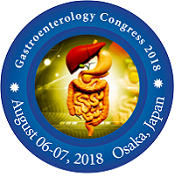Lem Edith Abongwa
Department of Biological Sciences, Faculty of Science, University of Bamenda, N. W. Region, Cameroon
Title: Hepatotoxicity and related Risk Factors of Severe Hepatotoxicity Among HIV-1 infected Individuals initiated on Highly Active Antiretroviral Therapy(HAART) in Cameroon
Biography
Biography: Lem Edith Abongwa
Abstract
Aims/Purpose: Hepatotoxicity due to highly active antiretroviral therapy (HAART) has gained prominent attention since it can be affected by many factors. The aim of this study was to determine the prevalence of hepatotoxicity and related risk factors of severe hepatotoxicity following HAART initiation.Methods: One hundred naive HIV-1 patients were recruited and followed up for 24 weeks. They were placed on either Tenofovir(TDF)+Lamivudine(3TC)+Efavirenz(EFV) or Zidovudine(AZT)+Lamivudine+Nevirapine(NVP) or Zidovudine+Lamivudine+Efavirenz regimen. Venous blood samples were collected to measure transaminotransferases (ALT and AST) and alkaline phosphatase (ALP), using colometric enzymatic reaction which were used to classified hepatotoxicity based on age and sex.Results: A total of 38(38%) and 55(55%) patients presented with hepatotoxicity while 15% and 28% of patients of them had severe hepatotoxicity at 4 and 24 weeks respectively. Serum levels of all enzymes increased significantly (p<0.05) with increased treatment duration. Univariate analysis revealed that the risk factor of developing severe hepatotoxicity was significantly (p<0.05) greater in patients <30years, males, low BMI, low monthly income earners and patient on AZT+3TC+ NVP regimen. While multivariate analysis showed that age <30 years, Low BMI, low monthly income and the use of AZT+3TC+NVP was an independent risk factors.Conclusions: Low BMI, <30years, low monthly income and the use of AZT+3TC+NVP regimen were identifiable risk factors for the development of severe hepatotoxicity. As such these factors should be considered as an important strategy by clinicians in preventing the hepatotoxicity.

